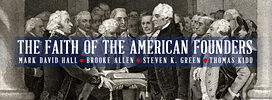I agree with most of Professor Kidd’s observations. As I suggested in my essay, we should resist forcing twenty-first century categorizations about belief onto those leaders of the founding generation who were, by all accounts, complex individuals. The presence of Christianity (Protestantism) in the founding culture was ubiquitous, so commentators should resist attempts to segregate its religious aspects from its secular ones. All of the founders were religiously literate—something that stands in stark contrast to many political leaders today—and were comfortable discussing religious ideas. But they were also synthesizers of Enlightenment rationalism and Whig political theories. Professor Kidd and I agree that “deism” was a broad and ill-defined perspective, at least its American variant. That’s why I prefer—like Professor Kidd—to consider figures like Washington and Jefferson theistic rationalists. But they were not conventional Christians.
Where Professor Kidd and I may disagree (slightly) is over the proposition that, as he writes, “faith played a powerful shaping role in the American founding.” That statement can mean several things. Certainly, as I wrote, religion shaped people’s attitudes (as much as I might try, I will never be able to shake off my evangelical upbringing), but it doesn’t necessarily mean it shaped the outcomes they sought in creating the new republican state and federal governments. As students of history, they understood the divisive role that religion had played in the political realm. Their rationalist leanings led them to ground the authority for government in Enlightenment notions of natural rights and the consent of the governed, not in some higher authority.

